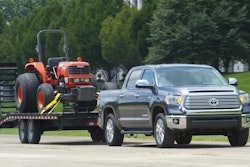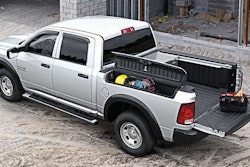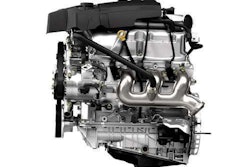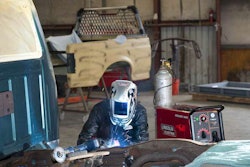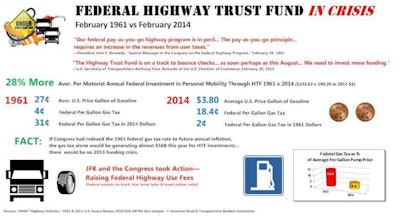 ARTBA graphic (Click to enlarge)
ARTBA graphic (Click to enlarge)The American Road & Transportation Builders Association on Friday published a plea and powerful graphic detailing the plight of the federal highway program – and, as ARTBA points out, this isn’t the first time the way the U.S. pays for roads has been on the brink.
Indeed, on Feb. 28 53 years ago, President John F. Kennedy “saw a threat to the nation’s future economic growth and security and grabbed the reins of leadership,” author Bill Toohey opens a piece published on the association’s website.
“Our federal pay-as-you-go highway program is in peril,” JFK said in the first sentence of a “Special Message to the Congress on the Federal Highway Program” sent up to Capitol Hill that day.
The ARTBA graphic above compares key measures: the price of gasoline, the federal tax and the weighted tax in 1961 versus 2014 dollars. The bottom line: The gas tax rate today is worth about two pennies per gallon, in 1961 dollars.
The problem, then as now: The user based revenue stream going into the Highway Trust Fund was not sufficient to keep the highway program running without going into deficit spending.
Kennedy told the Congress $900 million more dollars per year ($7 billion in 2014 dollars) was necessary.
“Our objective,” Kennedy said, “is to finance this program on a pay-as-you-go basis from… user taxes… at rates sufficient to pay the full cost of the program, without charge on general federal revenues… “The pay-as-you-go principle… requires an increase in the revenues from user taxes…”
It is clear, he said, “that a program essential to the nation, and to [the public’s] own welfare, requires that they cooperate in determining how present sources are to yield the additional revenues needed.”
As Toohey explains it, Kennedy offered what he called “A New Plan to Finance the Highway Program.” He urged Congress to sustain the federal gas tax revenue stream and increase the user fees on trucks – the federal diesel fuel excise increased from 4 cents per gallon to 7 cents; truck weight excise for vehicles over 26,000 lbs. from $1.50 per 1,000 lbs. to $5; the excises on sale of new tires from 8 cents per tire to 10 cents, the sale of tire inner tubes from 9 cents per to 10 cents, and tread rubber from 3 cents to 10 cents.
And June 29, 1961, the 87th Congress responded, approving the “Federal Aid Highway Act of 1961.”
The Highway Trust Fund crisis was averted. Construction on remaining segments of the 41,000-mile Interstate Highway System continued, along with improvements to the 848,677 miles of state roads important to the nation’s economy and security. And no American jobs were lost, ARTBA points out.
And the association argues that the federal gas tax is not “broken” or “outmoded” as a source of user revenue for the Highway Trust Fund.
The problem is that the rate has been frozen for 20 years, nor has it been adjusted to keep with inflation – even as the cost of road-building materials and labor have soared. (Today’s 18.4 cents per gallon federal gas tax has 50 percent less purchasing power than the 4 cents per gallon tax had in 1961, ARTBA notes.)
“It is a fact that if Congress had indexed the 1961 federal gas tax rate of 4 cents per gallon to future annual inflation, the gas tax alone would be generating almost $56 billion this year for Highway Trust Fund investments,” ARTBA says.
And that means no crisis looming Oct. 1 that could shut off federal investment for any new state highway, bridge and transit projects during coming fiscal year.
Of course, I don’t see how we can try to catch up all at once, but it’s ridiculous that the gas tax has never been tied to the cost of road construction. That’s a first, obvious step – and that should apply to any dedicated funding mechanism. After that, we need a plan to phase in the tax increase while rebuilding the trust fund surplus – and it shouldn’t be so much a matter of how, but of how much.
And while there’s room to be creative in finding ways to bridge the immediate shortfall, there’s no need for policy makers to reinvent the wheel just yet.
Just do math, make a plan and stick to it.
Nobody will like a tax increase, but a few cents per gallon at the pump doesn’t seem to hurt nearly as much as a front-end realignment – and potholes are nothing compared to the damage a poor transportation system will do to the American economy in the long run.
And, as is emphasized in every debate on this, highway investment creates jobs directly. Period.
So show some courage, Washington.

